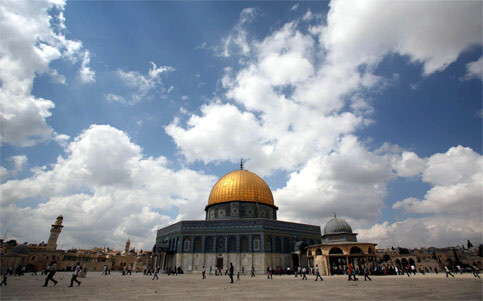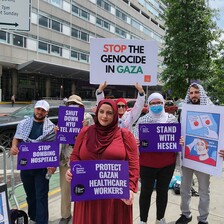
In recent years Palestinians from the West Bank have been prohibited from passing through the many checkpoints to Jerusalem, preventing them from visiting holy sites like the Dome of the Rock at the Haram al-Sharif. (Moammar Awad/MaanImages)
25 July 2007
Today was the first time in the past seven years that I entered Jerusalem legally. I have a green West Bank Palestinian ID, which means that since the 2000 intifada started and the wall was built, I’m forbidden from entering any part of Israel as well as Jerusalem, which is only 20 minutes away from my home town of Ramallah.
However, this hasn’t stopped me from going there. I would climb sandy hills opposite to Qalandia checkpoint (the main checkpoint at the entrance of Jerusalem), hide behind buildings from the sight of the Israeli soldiers, and sneak into Jerusalem. The danger was worth a chance to get into the town for the day, walk through the Old City, and be in the world on the other side of the wall.
It was also important for me to see Israelis, to be able to interact with them and see them stripped of the army uniform; it was important for my sanity, and a necessary need to destroy the image of a collective nation of green-uniformed monsters.
Today was different. I was given a permit to accompany my mother to the hospital for her chemotherapy, a treatment that is not available in Ramallah or any other Palestinian city in the West Bank. Basically, cancer gave me the green light to step into Jerusalem.
The trip started very early in the morning. As we got to Qalandiya checkpoint where Israel controls movement between Ramallah and Jerusalem — and which is now more of a border or terminal than a simple checkpoint — we had to prepare our green IDs and permits, walk through a metal detector, and then hold up the IDs and permits to a glass window for the Israeli soldier behind it to see and enter our information into a computer. As I stood there with both my hands holding my papers against the glass, I could only think, “I hate the occupation, I hate cancer, and I hate our desperate need for this city and the hospital.”
As we walked through the border, there was an empty vast space. We crossed and looked for a cab to take us to the hospital, and the first question the cab driver asked was, “Green [Palestinian] or blue [Israeli residency] ID?” When the answer was green, we had to take an alternative and much longer route to the hospital. The color of our IDs determines which roads we can and cannot drive on in and around Jerusalem.
The hospital was huge; it consisted of a number of old buildings. It was the typical Israeli hospital, metal detectors and Israeli flags at the entrance and on the inside, large pictures of the “pioneers” of the state of Israel. It was nothing very unusual. The structure of the Israeli society could be clearly understood by walking through the hospital halls. The janitors were Palestinian, the doctors were Israeli. On the oncology floor there were renovations underway and the workers were, of course, Palestinian.
The oncology unit was very neat and had a lot of nurses, and after we talked to the doctor we headed to a section to get the IV and start the chemotherapy. Soon after we found out that the pharmacy did not approve my mother’s insurance because it was being paid by the Palestinian Authority. What came next was a bureaucratic fiasco to get the insurance cleared, but one person came to our rescue: Rifkah.
Rifkah is an Israeli nurse, probably in her thirties, who works full-time in the oncology unit and administers medicine. She was one of the few in the entire unit who spoke English, and she fought half the staff to get my mother’s insurance approved. She stood in front of my mother, opposite to the administration desk responsible for approving the medicine, and yelled in Hebrew at a couple of employees who were in need of an additional signature to get the dose ready. She kept checking up on my mother for the entire day to make sure got the attention she needed and to make sure all her questions were answered.
The oncology unit in Shaare Zedek hospital in Jerusalem is one of the very few places were Palestinians and Israelis are humane to one another. There was so much kindness and friendliness going on. Everyone on that floor felt the need for a connection, and forgot about the walls, checkpoints and hatred that exists outside.
A few of my friends, my aunt and I sat around mom for the few hours. While the medicine was slowly creeping into her blood stream, we talked about cancer; Jerusalem; positive energy; Washington, DC; my apartment; and a million other topics. Conversations in the chemo lounge were conducted in Arabic, English, Hebrew, and sometimes even Russian, and no one seemed to mind the weaving of words in all accents and languages.
When the treatment was over Rifkah came to say goodbye to my mother. Mom asked her if she would be in tomorrow, but Rifkah said that unfortunately she had taken the day off. “No! It’s my bad luck you wont be here,” Mom laughed. I knew that during that brief moment, my mother forgot the checkpoint, her aggravation with Hebrew — the language of the occupier — and the endless days of curfew and only remembered Rifkah, the helpful nurse, who made her day slightly easier.
Before going back to Ramallah, we took a stroll up the Mount of Olives, and through the Old City. Jerusalem didn’t seem that cozy, familiar, or breathtaking, but I couldn’t help but think that somewhere in West Jerusalem sits an old hospital where understanding, and perhaps even a strange form of love persists.
Tala A.Rahmeh, originally from Yaffa, is currently pursuing an MFA in creative writing at American University in Washington DC. She is the managing editor of Folio, American University’s national literary publication. Living between DC and Ramallah. Tala can be reached at tala DOT ar AT gmail DOT com


